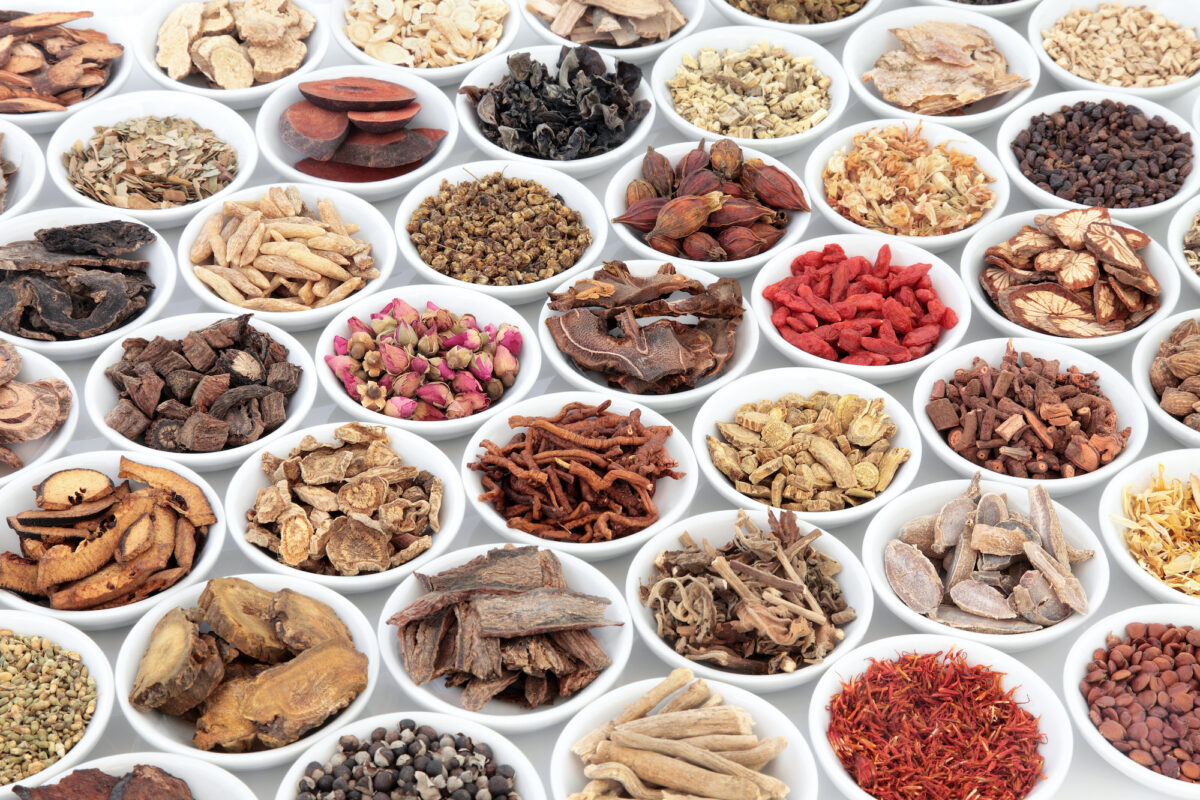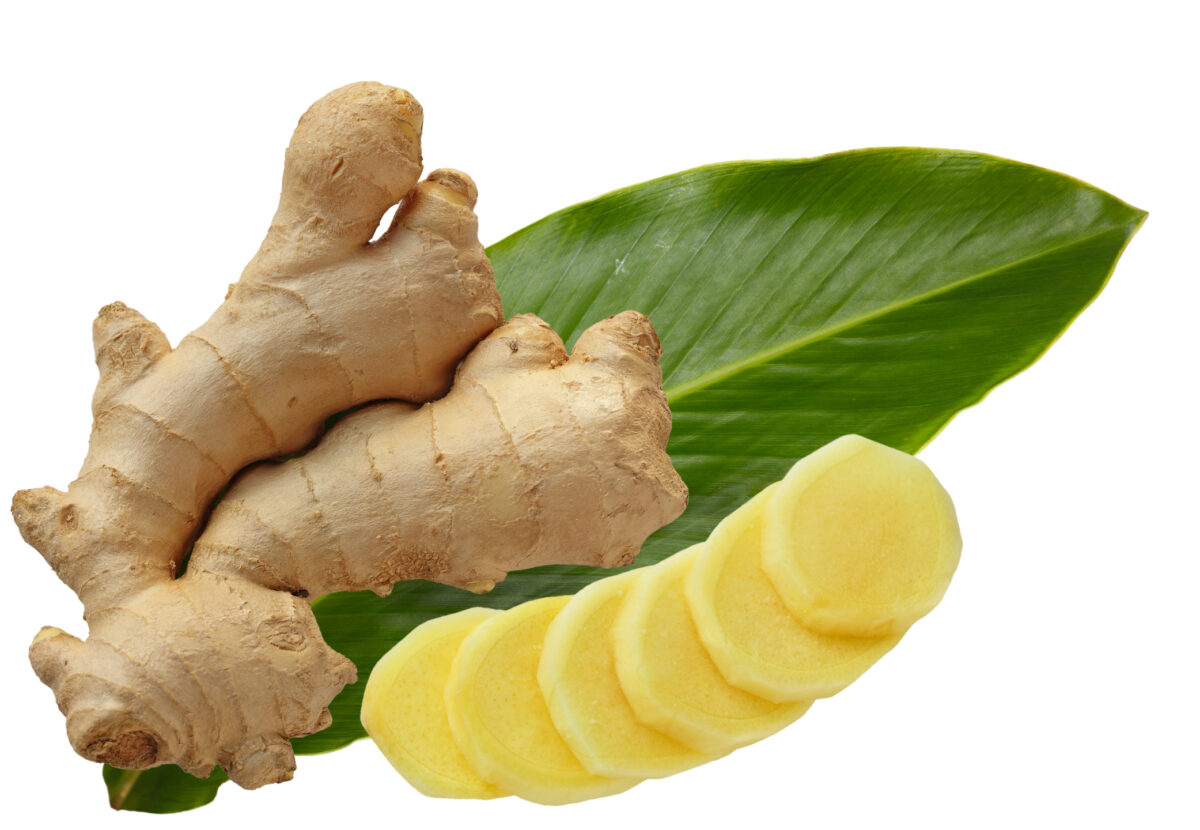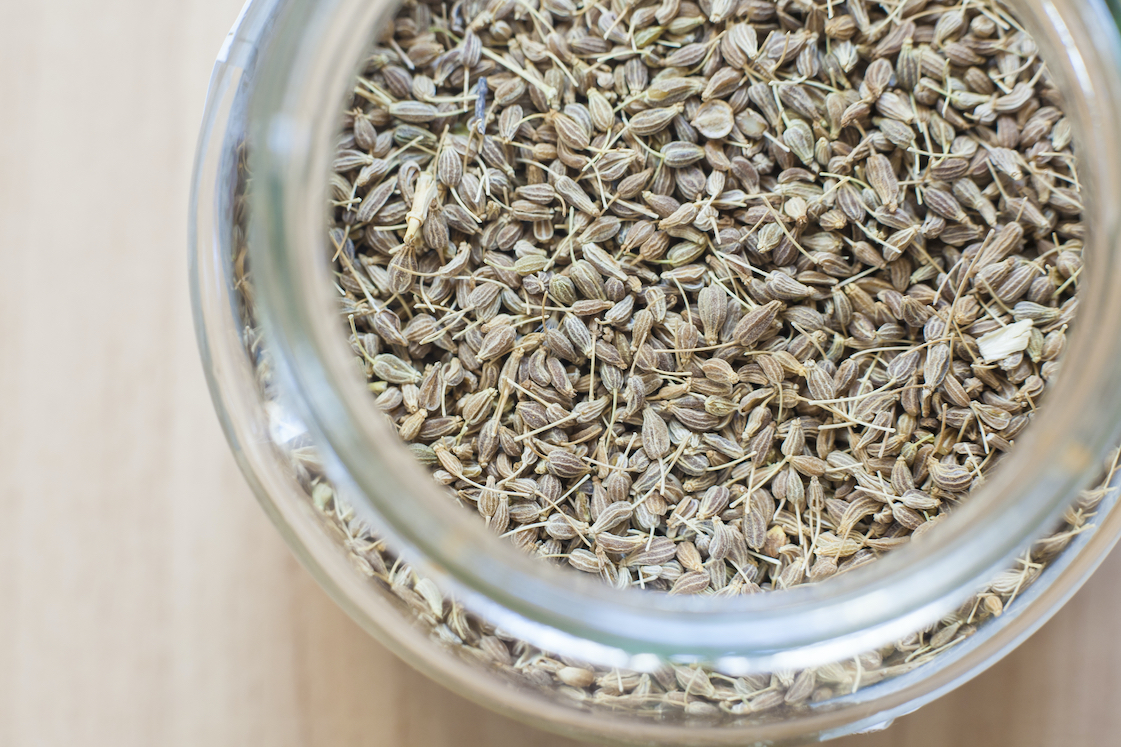HERBAL TEAS
Hot and Cold Infusions and Decoctions
One of the most ancient and most simple healing preparations of medicinal plants, herbal tea is made by combining herbs with water. Depending on the preparation method, herbal teas can be called infusions, tisanes, or decoctions. Teas are ideal for treating a wide variety of acute and chronic conditions. In contrast to the potentially harsh effects of alcohol extracts on the mucous membranes, internal organs, and other tissues, teas are soothing and widely tolerated. Teas are relatively affordable as a long-term therapy, and can be effective vehicles for delivering potent medicine.
Preparing and drinking herbal tea helps individuals to slow down and pay more attention to their bodies and health. This critical component of healing is often missing in modern medicine.
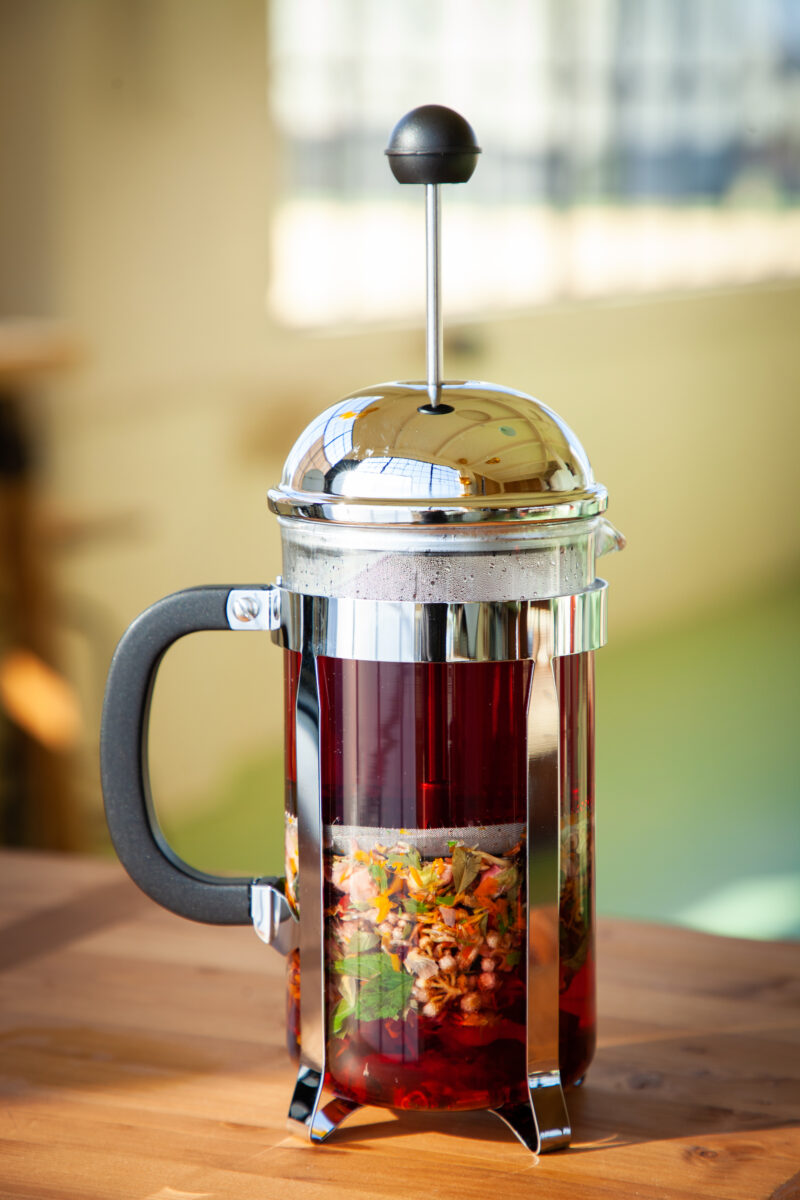
The Vessel
Herbal tea should be prepared in a closed vessel, ideally with a tight-fitting lid. The vessel should be made of glass, porcelain, glazed earthenware, or stainless steel. Avoid using aluminum, tinned iron, or other metallic vessels that can leach into the preparation.
Proportions for Dry Herbal Tea
Depending on the therapeutic goal or the herb’s strength, age, or condition, different proportions may be utilized to prepare a tea. Dosages in this text assume the following proportion: for infusions and decoctions, combine one ounce of herb (by weight) to 30 ounces of water (by volume).
Other methods can be employed. The standard pharmacopoeia method is to combine one part herb to 20 parts water, or 50 gm of herb to 1000 ml of water. The Simpler’s method combines 6-8 tablespoons of herb with each quart of water.
Proportions for Tea using Fresh Herbs (Simpler’s Method)
Fresh herbs have high water content, and tend to be less concentrated than dry herbs. For this reason, when preparing tea using fresh herbs, it is best to use larger volumes of plant material than when using dry herbs. For an infusion, pack the vessel one-half to three-quarters full with fresh herbs, then fill it with water. For decoctions that are generally made with denser plant material, only fill the vessel one-quarter to one-third full with fresh herbs.
Storage
Herbal tea is often made in one-quart batches and is best prepared fresh each day. However, if the tea is refrigerated or stored in a very cool environment, it can last 36-48 hours before it begins to taste flat or starts fermenting.
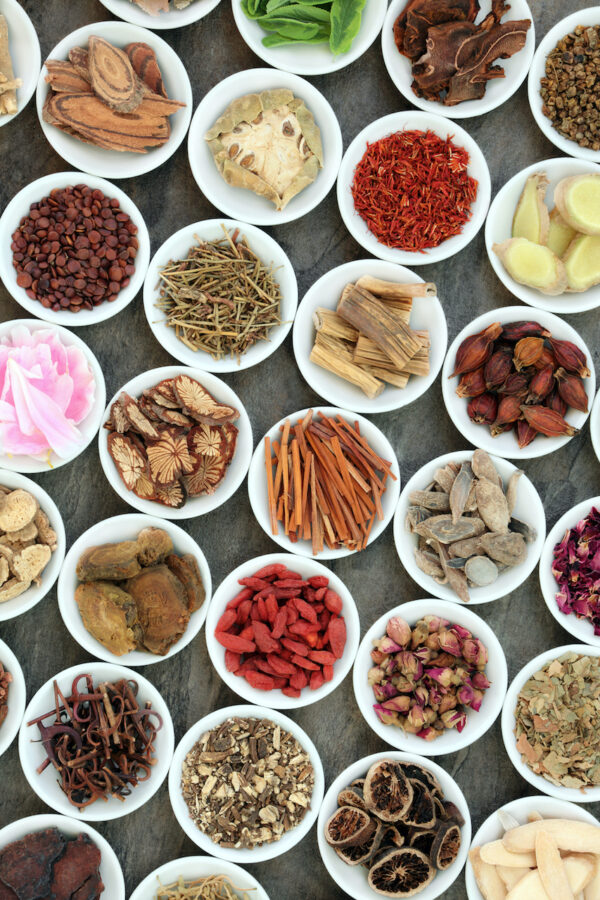
Dosage for Acute and Chronic Health Conditions
When treating acute health conditions, it is best to drink small doses of tea frequently - about four to six ounces every one to two hours throughout the day. When treating chronic health conditions, less frequent dosing is acceptable - drink two to three 10-ounce cups (up to one
quart in total) of tea daily. Teas are most quickly absorbed on an empty stomach.
Preparing Infusions vs. Decoctions
Tea can be prepared as an infusion or a decoction, depending on the type of herb and part of the plant used. Infusions are usually made with the more delicate parts of the plants, including the flowers, leaves, soft stems, and buds. Boiling these parts of the plants will often destroy or injure their medicinal properties. Infusions extract the vitamins, minerals, volatile oil, mucilage, and other constituents from the plants. Infusions extract vitamins, minerals, mucilage, and other constituents from plants.
Avoid Powdered Herbs in Tea
Dried herbs are best prepared for extraction by water when they are cut and sifted or sliced. Fine powders are more difficult to strain and should be avoided when making infusions. Although it is not imperative, fresh herbs can be chopped or bruised to release the volatile oil.
HOT INFUSIONS
Hot infusions are made with plants with medicinal components that can be extracted in a relatively short amount of time.
Steeping Time
A medicinal infusion should steep a minimum of 30 to 60 minutes; especially for teas containing minerals or mucilage, the ideal steeping time is even longer. Infusions can steep all day; however, do not steep it so long that the tea begins to spoil. One option is to prepare herbal tea before going to bed, allow it to steep overnight, and re-warm it for consumption the next day. This is recommended for nutritive herbs.
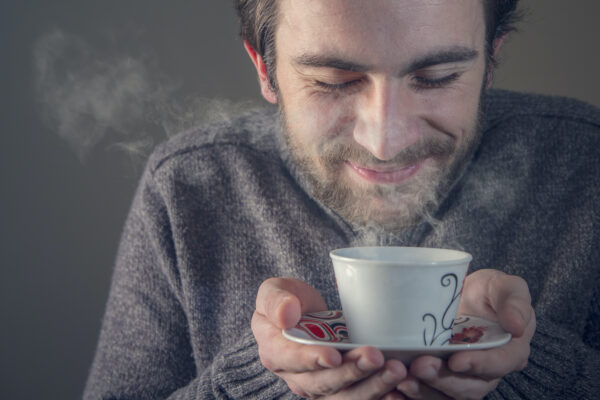
Exception to Steeping Time: Herbs Containing Tannins
Tannins can be extracted in two to five minutes. If plants with large quantities of tannins are allowed to steep longer, they can become very astringent, and sometimes bitter or sour. Tannins can upset the stomach; reduce the possibility of this by infusing the herbs for just a short amount of time in hot water that is slightly below boiling temperature or prepare a cold infusion.
Examples of plants that contain tannins are black tea (Camilla sinensis), green tea (Camilla sinensis), oak bark (Quercus), and raspberry leaf (Rubus). When combining these plants with other herbs, steep the non-tannin containing herbs for at least 30-60 minutes, then add the tannin-containing herbs to the infusion up to five minutes before the tea is ready to strain. Alternately, these herbs can be prepared as a single herb tea or cold infusion.
Method of Preparation
Pre-warm a vessel by running it under moderately hot water or pouring a small amount of boiled water in for a few moments. This prevents glass or porcelain vessels from cracking.
- Method One - Place the herbs in a pre-warmed vessel such as a mason jar, and pour hot water over them. Cover and steep at least 30 minutes. Strain the herbs and serve.
- Method Two - Place the herbs in a pot with cold water and cover. Slowly bring the water close to a boil and remove the vessel from heat. Allow to steep at least 30 minutes. Strain the herbs and serve.
COLD INFUSIONS
Cold infusions are made from plants with medicinal components that need longer infusion times. This method is also useful for herbs containing constituents that are destroyed in the process of heating. To prepare, place the herbs in a tea bag or tea ball, then moisten them with a small amount of water and place in a vessel; fill the vessel with room temperature water. Then suspend the tea bag or ball at the top of the vessel (but still submerged in the water), perhaps by holding it in place with the lid of the vessel. This allows a passive circulation process to improve the extraction of the herbs. Allow to steep overnight. Consume the infusion the next morning.
SOLAR AND LUNAR INFUSIONS
Solar and lunar infusions are subtle preparations that imbibe the majestic forces of nature. Use the cold infusion method when preparing solar and lunar infusions, as the tea will be more potent.
- Solar infusions - Place the herbs and water in a glass jar with a lid and allow them to steep in the sun several hours.
- Lunar infusions - Place the herbs in a glass jar or bowl, cover them with water and a lid or muslin cloth, and steep overnight outside under the moonlight.
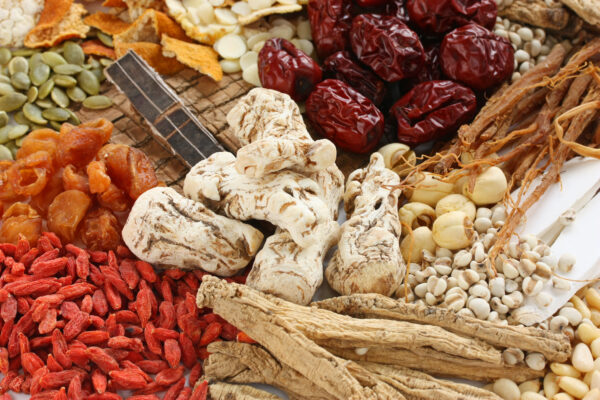 DECOCTIONS
DECOCTIONS
A decoction effectively extracts dense plant materials such as barks, roots, rhizomes, seeds, and nuts. Place the herbs in a vessel with room temperature water and a tightly-fitting lid. Bring the water and herbs to a gentle boil and turn the heat down to a low rolling simmer; allow to cook for at least 30 to 60 minutes, though the herbs can be decocted for hours. Generally, the longer the tea simmers, the sweeter and more harmonious the result. Take care not to allow the water level to drop too low as the water boils off; to prevent this, increase the initial water volume by 50-100%, especially when simmering the tea for a long time. After removing from heat, either strain the tea immediately or allow the herbs to steep in the water up to 12 hours before consuming.
The herbs may be brewed twice before discarding the remaining plant material (referred to as the marc), although the tea becomes weaker with consecutive brewings. Optionally, add new herbs to the reused herbs to increase decoction potency.
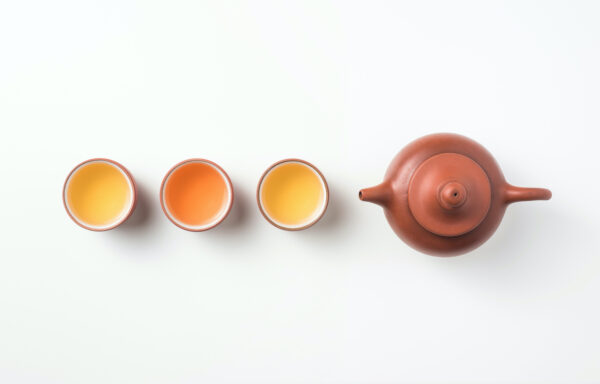
Combining More Dense and Delicate Plant Parts in Tea Blends
Some recipes call for combining herbs that need different preparation methods. To prepare, separate the herbs into two groups: denser herbs that need decoction, and delicate herbs that need infusion. To proceed, first decoct the denser herbs; then remove the tea from the heat source, add the delicate herbs to the pot, and replace the lid. Infuse the herbs at least 30 minutes, then strain and drink.
© Copyright – Christa Sinadinos

